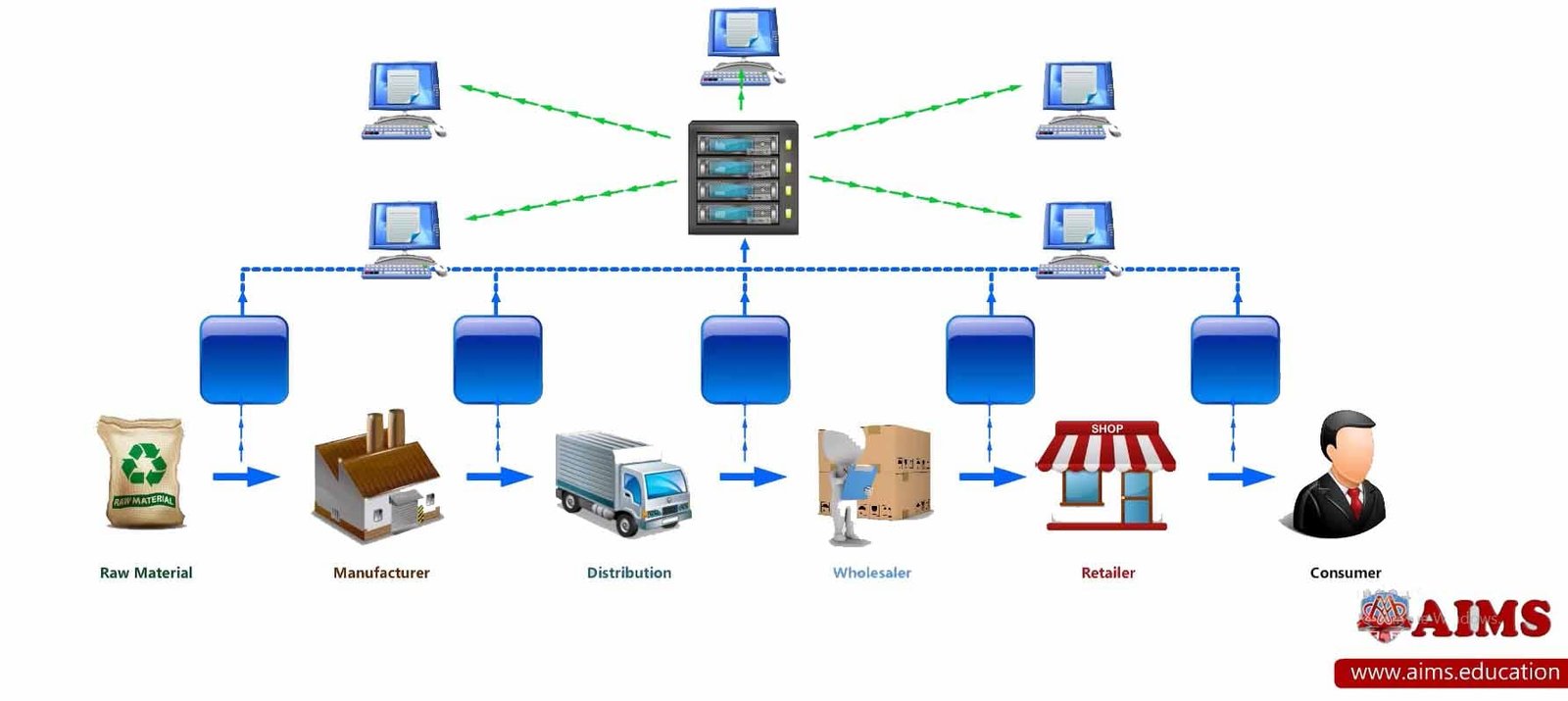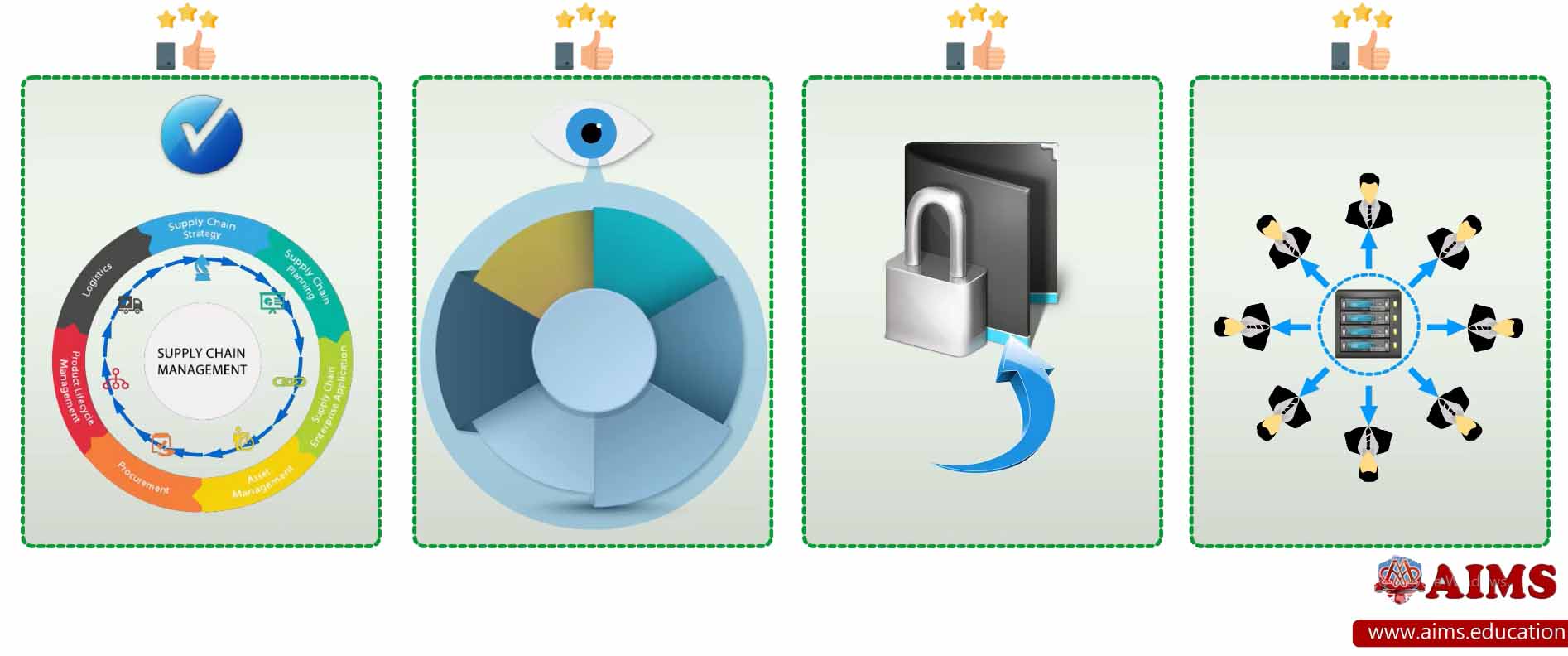What is Blockchain Supply Chain?
If you have ever heard the term “blockchain,” you’re probably thinking about Bitcoin or any other type of cryptocurrency. While it is true that this is how the blockchain appeared, it is a rather versatile solution for a wide range of problems. For example, it could solve issues in supply chain management and make the involved processes run smoother. Blockchain supply chain management provides a decentralized database shared among the supply chain partners, which ultimately helps organizations cut costs and improve efficiency. The benefits of blockchain technology in supply chain management are endless, but some of the most obvious are increased transparency and trust between the partners. So, let us understand how blockchain in supply chain management can improve the SCM industry.
How Does the Blockchain Work in Supply Chain Management?
With the blockchain in supply chain management, the potential of supply chains grows exponentially. To make it easier for you to understand how the blockchain in supply chain works, you should think about it as a very large database. But, in comparison with traditional databases, the blockchain is not controlled by anyone or any entity. However, changes or updates can take place in the blockchain, but only if the majority of its participants agree with the change. Thus, besides being capable of managing large amounts of data, the blockchain can make processes easier while giving everybody an equal share of rights.
Blockchain technology in SCM is a part of the Diploma in Supply Chain Management and Global Logistics online program and Part-Time Online MBA concentration in Supply Chain Management. These programs are offered through a flexible learning system, and they lead to the PhD in Logistics and Supply Chain Management – a research-based doctorate degree.
Key Advantages & Disadvantages of blockchain in supply chain management:
ADVANTAGES
- Improved collaboration between the parts involved in the supply chain;
- Transparency in every stage;
- Improved security and encryption;
- Decentralization of data and the possibility to reach consensus;
DIS-ADVANTAGES
- It may be challenging to make a blockchain scalable;
- A lack of controls concerning data access;
- It may not be completely compliant with the legislation of some countries;
How Blockchain Will Transform the Supply Chain Industry?
There are many things that can be significantly improved in the supply chain industry with the help of the blockchain. For example:
- Every transaction is recorded on one of the blocks belonging to the blockchain and on the numerous copies on the entire ledger.
- These recordings are then distributed over a larger number of computers, making the information highly available and, therefore, very transparent.
- Increased security is another advantage of using the blockchain in supply chain, as one block is only connected to the one that follows it and the following to the next, and so on and so forth.
Thus, it is extremely difficult to compromise the security of a blockchain in supply chain managment.

How is Blockchain Used in Supply Chain?
Let us take a look at businesses in the food industry, for example. Because these businesses, like restaurants, work with fresh produce, it is crucial for the business to follow the produce from their source to the end client, as they are highly perishable. Due to the fact that it is more transparent, it is easier to track pork sourced from China, for example, with the blockchain, tracking down every piece of meat, how it is processed, where it is delivered, and when it is sold. Thus, the entire supply chain management process is made more effective so that the end consumer enjoys a greater level of quality.
Blockchain in Supply Chain Example
Blockchain in supply chain provides valuable security benefits. Here are few more examples of blockchain in supply chain:
- An inaccurate shipping address could lead to products being lost or stolen. With blockchain in supply chain, shipping information is tracked and recorded on a public ledger, making it much more difficult for this type of fraud to occur.
- Blockchain can also be used to verify the authenticity of products, from food to luxury items. By using a smart contract or token system, consumers can be assured that what they’re buying is what it says it is.
Types of Blockchain in Supply Chain
If you’re looking for ways to implement blockchain in your supply chain, keep in mind that there are different types of blockchain technology in supply chain. Some work better for certain applications than others. For example:
- Private blockchains are suitable for supply chain management businesses that want to keep their data private; whereas,
- Public blockchains are best suited for applications that require transparency and security.

6 Key Benefits of Blockchain in Supply Chain
Blockchain technology in supply chain management offers several significant benefits:
1. TRANSPARENCY
Blockchain provides a transparent ledger that records all transactions across the supply chain. This transparency allows all participants to have a single version of the truth, reducing disputes and increasing trust among partners.
2. TRACEABILITY
With blockchain technology in supply chain, each product can be traced back to its origin. This feature is particularly valuable in industries such as food and pharmaceuticals, where knowing the source of each ingredient is critical for safety and quality control.
3. EFFICIENCY
By automating and streamlining processes through smart contracts, blockchain supply chain can reduce the amount of manual paperwork and administrative overhead. This leads to faster transaction processing and reduced costs in logistics and supply chain.
4. SECURITY
The decentralized and immutable nature of blockchain makes it highly secure against tampering and fraud. Each transaction is encrypted and linked to the previous one, making it nearly impossible to alter or forge.
5. COMPLIANCE
Blockchain in supply chain can help ensure compliance with regulatory requirements by providing a transparent and immutable audit trail. This capability is essential for industries that must adhere to strict regulatory standards.
6. COST REDUCTION
By improving efficiency and reducing the need for intermediaries, blockchain can lower the overall costs of the supply chain. Streamlined processes and reduced fraud-related losses contribute to significant cost savings.

How to Implement Blockchain in Supply Chain?
Implementing blockchain technology in supply chain involves a series of key steps to ensure a seamless and effective integration. Below is a list of crucial steps to implement blockchain in supply chain management:
Step 1: Identify Use Cases
- Determine specific areas within the supply chain that can benefit from blockchain.
- Common use cases include traceability of products, reducing fraud, and improving transparency.
Step 2: Select the Right Blockchain Platform
- Choose a blockchain platform that aligns with your business needs.
- Consider factors like scalability, security, and public vs. private blockchain options.
Step 3: Set Up the Blockchain Network
- Establish the necessary infrastructure, including nodes and consensus mechanisms.
- Define the governance model and roles for participants in the supply chain network.
Step 4: Integrate with Existing Systems
- Ensure that the blockchain solution can seamlessly integrate with current supply chain management systems.
- Use APIs and middleware to facilitate data exchange between different technologies.
Step 5: Develop Smart Contracts
- Create and deploy smart contracts to automate processes and enforce agreed-upon terms.
- Ensure that the contracts are secure and tested thoroughly to prevent vulnerabilities.
Step 6: Onboard Stakeholders
- Educate and onboard supply chain partners and ensure that they understand the blockchain technology in supply chain, as well as their roles.
- Provide necessary training and support for smooth adoption.
Step 7: Data Input and Verification
- Implement mechanisms for accurate data entry and verification at each stage of implementing blockchain in supply chain.
- Use IoT devices and other supply chain technologies to capture real-time data.
Step 8: Monitor and Audit
- Continuously monitor the blockchain network to check your supply chain management performance and compliance.
- Conduct regular audits to ensure data integrity and address any issues promptly.
Step 9: Scale and Improve
- Finally, explore opportunities for scaling up.
- Gather feedback and make necessary improvements to enhance the efficiency and effectiveness of blockchain technology in the supply chain.
Final Words
With the help of blockchain technology, it is extremely easy to transform a regular supply chain into an effective global supply chain. This is because there is no need for a bank to make payments, as funds can be transferred from anywhere with ease and in complete safety. Besides transparency, supply chains that use blockchain technology will also become more effective, saving time, effort, and resources. The supply chain technologies are discussed in more detail in the Diploma in Logistics and Supply Chain Management and Logistics courses, offered by AIMS’ Institute of Supply Management.
